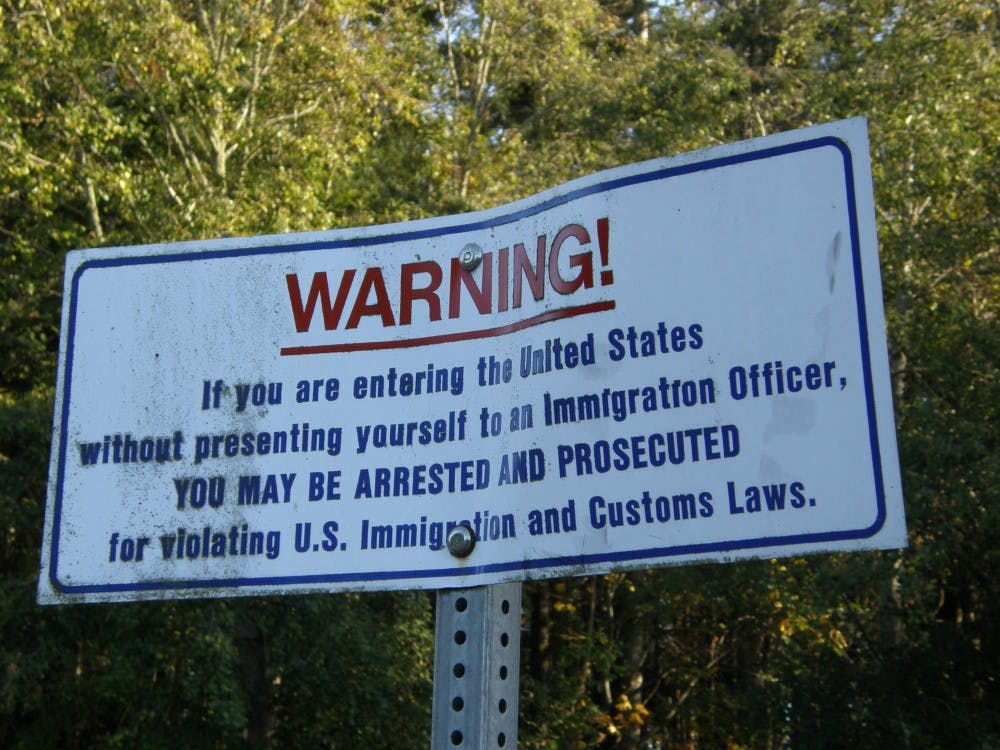Milam's Musings, milambc@miamioh.edu
I don't have any strong memories of my time as a toddler. There are pictures that prove I existed, like one where I'm holding a book bag, ready to go to preschool with my oversized glasses, looking like a ginger version of the kid from "Jerry Maguire."
I'm sure if a random moment triggered it within me, I could draw out a memory, as our ability to contain memories develops more strongly a little after the three-year mark. But to sit here and think about it, no.
To get a better picture of what I may have been like as a toddler, I called my mom. She said I was "relaxed, quiet and calm." She furthered added that I read the age-appropriate books fairly well.
However, I wonder if, at that time, I could've defended myself in immigration court, having read and understood the necessary immigration laws.
Last week, a federal immigration judge based out of Virginia argued in a deposition that migrant toddlers can defend themselves in court.
"I've taught immigration law literally to three-year-olds and four-year-olds. It takes a lot of time. It takes a lot of patience," Judge Jack Weil said. "They get it. It's not the most efficient, but it can be done."
I find three things immediately appalling about this situation.
First and foremost, we call children fleeing abuse, torture and other violence in their home countries, often crossing the border alone, "migrants" or "immigrants." They are clearly refugees.
In total, 20,455 unaccompanied youths were caught at the border from October of last year through the end of January 2016. Half of them will go to court without a lawyer and some are as young as two.
Secondly, in immigration court, children charged with violating immigration laws have no rights to an appointed counsel, according to the Washington Post.
Our criminal justice system's bedrock principle is due process, but it would seem the government, in this particular scenario, stacks the deck in its favor - which isn't at all surprising.
Enjoy what you're reading?
Signup for our newsletter
The most frustrating part is that, if these children had representation, they most likely would qualify for legal immigration status given their circumstances of fleeing violence in their home countries.
But as former Los Angeles Times reporter, Sonia Nazario, said in the New York Times, only around seven percent of those who were placed in federal custody between 2007 and 2009, and who had received a ruling by 2010, were winning cases.
Third, and the most obvious point that should be readily appalling, Judge Jack Weil thinks children can be taught immigration law such that they can make not only informed decisions, but defend themselves in a courtroom adequately.
Keep in mind as well that these children not only likely don't speak English, they may not even be able to read yet.
Laurence Steinberg, a psychology professor at Temple University, said in the Washington Post that children that young do not yet have logical reasoning abilities.
"It's preposterous, frankly, to think they could be taught enough about immigration law to be able to represent themselves in court," Steinberg said.
Senate Minority Leader Harry Reid and other Democrats introduced a bill to require the government to provide an attorney to these refugees.
The ACLU, along with a few other organizations, is also suing the Justice Department over the situation, saying it violates the U.S. Constitution.
I'm nearing graduation at Miami University and I'm not sure I could adequately represent myself and navigate the complex web of immigration law, much less if I was transported back to my "Jerry Maguire" kid days.
My three-year-old nephew and I had a conversation the other day. He's going through potty-training now and he knows if he uses the potty, he gets a toy. He was asking me if I'd go to Walmart and get him this "humongous dinosaur toy" he wanted. I asked him if Walmart was his favorite place, to which he said, yes.
Imagining my nephew, who can string together some simple sentences and do some basic problem-solving, standing before Justice Department-trained immigration lawyers and pleading his case for legal status in the U.S., is laughable.
And that's with the understanding that my nephew has grown up in a middle-class family with a safe and secure upbringing. The kids discussed in this article are fleeing near-unimaginable horrors and violence, then being asked to navigate the legal system.
Crossing the border is no small feat, either.
Unlike me, they probably won't have the advantage of forgetting those traumatic memories.
In a 2014 Justice Department motion, they argued giving the children lawyers would be an enormous expense to taxpayers.
That same year, President Obama asked Congress to fund a $3.7 billion plan to deal with the migrant crisis, of which, $15 million would go to legal representation for unaccompanied children. (It should also be noted, as something of an aside, that $5 million was requested for a media campaign to tell families in Mexico and Central America to not come to the U.S.)
Meanwhile, taxpayers spent $18 billion on immigration enforcement in 2013.
Taxpayers will also end up spending $1.5 trillion - to repeat, trillion - on the Marines' new F-35 fighter jet. And it doesn't even work well.
Then there's the $43 million taxpayers spent on a gas station in Afghanistan.
I, for one, wish the government didn't use my money to drone children overseas, but rather, tried to help save the ones fleeing violence in their home countries (which we helped cause, but that's another column) by coming here.
It's just a matter of our priorities and what we care to get riled up about when it comes to how the government spends our money.




